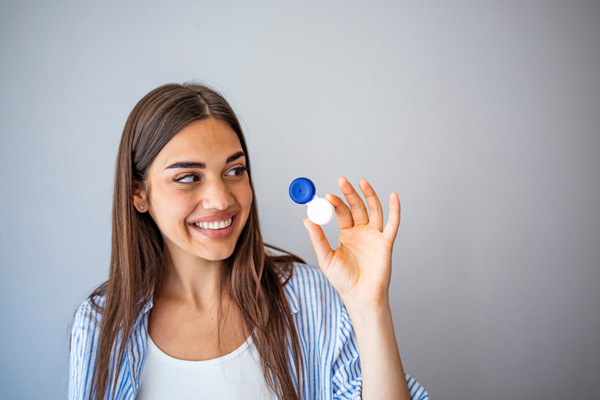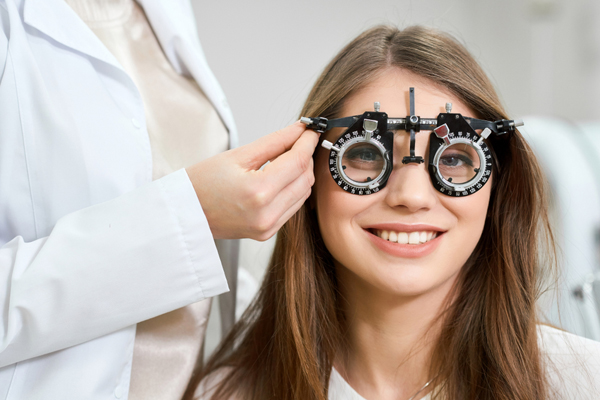What Are the Different Types of Contact Lenses?

Contact lenses are a great choice for people who need vision correction but would rather avoid having to deal with wearing glasses full-time or LASIK surgery. These lenses go directly on the eye, and they have evolved a lot in the past few decades. Adaptive contact lenses that protect your eyes against sunlight now exist along with extended wear contacts that can stay in for months.
Figuring out the best type of contact lenses
One of the most important things to do when shopping for contact lenses is to consider the materials that the different types of lenses are made with. There are five main types of contact lenses, which are:
- Soft lenses: These contact lenses are made from gel-like plastics that contain water called hydrogels. These are very thin lenses that conform to the front surface of the wearer’s eyes. They are responsible for the popularity of contact lenses thanks to how comfortable they are from the time they’re inserted
- Silicone hydrogel lenses: These are a more porous type of soft contact lenses that allow more oxygen to reach the cornea when worn. This allows the wearer to use the lenses for significantly longer periods
- Gas permeable lenses: These are hard contact lenses that are very similar to polymethyl methacrylate (PMMA) lenses, but they allow more oxygen to get to the cornea. They also fit better than conventional hard lenses, and they tend to lead to sharper vision than soft contact lenses, especially for those dealing with astigmatism. It takes a few weeks to get used to wearing GP lenses, but they eventually become as comfortable as soft lenses
- Hybrid contact lenses: Hybrid lenses can be as comfortable as soft contact lenses, and they provide the sharp vision associated with gas permeable lenses. Hybrid contact lenses have a rigid glass permeable center that is surrounded by hydrogel material. While these types of lenses provide the best features of soft and hard contact lenses, they are more expensive than soft lenses and can be more challenging to insert or remove
- PMMA: PMMA contact lenses are made from a rigid, transparent material and provide excellent optics. However, these lenses restrict the flow of oxygen to the eye, and they can be quite uncomfortable when starting. This type of contact lens was the first type, but gas permeable lenses are typically preferred over them nowadays
Commonly asked questions about contact lenses
Let us go over the answers to some commonly asked questions about contact lenses:
1. What are contact lenses?
Contact lenses are thin, curved pieces of plastic placed directly on the eye's surface to correct vision problems.
2. How do contact lenses work?
Contact lenses correct vision by bending the light that enters the eye. This is because they have a different curve than your eyes, which helps to focus the light in the right way on the back of your eye.
3. Who can wear contact lenses?
Most people can wear contact lenses, but there are some exceptions. People with certain medical conditions, such as dry eyes or allergies, may not be able to wear them. It is also essential to make sure that you follow all of the instructions for cleaning and storing your lenses properly to avoid eye infections.
4. How long can I wear contact lenses?
You can wear contact lenses for as long as you want, but it's crucial to take them out every night to give your eyes a break. Some people wear them for a few hours at a time, while others wear them all day long.
5. How do I take care of my contact lenses?
You should always wash your hands before handling your contact lenses. Be sure to clean your lenses according to the manufacturer's instructions, and store them in a clean case when you're not wearing them. You should also replace your lenses as often as recommended by your doctor.
6. Can I wear contact lenses if I have astigmatism?
Yes, you can wear contact lenses if you have astigmatism. There are special types of contact lenses called "toric" lenses designed to correct this vision problem.
7. How often should I see my eye doctor?
If you wear contact lenses, you should see your eye doctor at least once a year for a check-up. Your eyes can change over time, and you may need a new prescription for your lenses.
We have the right type of lenses for you
Studies show that silicone hydrogel lenses are the most popular in the U.S., with 64% of those who wear contact lenses choosing them, followed by soft lenses at 22% and gas permeable lenses at 11%.
If you have ever worn all three types of lenses, these numbers may not be surprising. Gas permeable lenses get you sharper vision, but the discomfort that comes with wearing them negates this benefit. Soft contact lenses adequately correct vision, and it is easy to forget you have them in. Call or visit our Mt Vernon clinic to learn more about the different types of contact lenses.
Request an appointment here: https://brighteyesmv.com or call Bright Eyes Optometry at (914) 668-1429 for an appointment in our Mt Vernon office.
Check out what others are saying about our services on Yelp: Read our Yelp reviews.
Recent Posts
Emergency eye care is needed if you find yourself dealing with a problem with your eye that causes pain or affects your vision. Failing to treat eye injuries as soon as they are detected can lead to permanent consequences, like reduced vision or blindness. Common eye injuries that require emergency eye care include: Exposure to…
Looking for more information on eye protection? An ophthalmologist knows everything there is to know about protecting the eyes. While there are a few different types of eye care professionals, ophthalmologists are eye care professionals who have undergone additional years of education and training so they can offer their patients both medical and surgical eye…
Controlling myopia at an early age can slow down its progression. This can help prevent yearly upgrades for stronger glasses. Your optometrist can help by offering various treatments. If you want to find out how your optometrist can help control myopia, here are the details.Optometrists use atropine eye drops to achieve short-term myopia control results.…
Another word for an itchy eye is ocular pruritis. It is a common health situation in many people. Itchiness in your eyes is more than enough reason to see an optometrist. Receiving prompt treatment is important in receiving prompt relief. If you want to know what causes an itchy eye and the treatments for it,…



